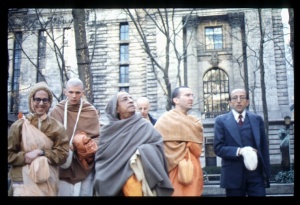BG 10.26 (1972)

A.C. Bhaktivedanta Swami Prabhupada
TEXT 26
- अश्वत्थः सर्ववृक्षाणां देवर्षीणां च नारदः ।
- गन्धर्वाणां चित्ररथः सिद्धानां कपिलो मुनिः ॥२६॥
- aśvatthaḥ sarva-vṛkṣāṇāṁ
- devarṣīṇāṁ ca nāradaḥ
- gandharvāṇāṁ citrarathaḥ
- siddhānāṁ kapilo muniḥ
SYNONYMS
aśvatthaḥ—the banyan tree; sarva-vṛkṣāṇām—of all trees; devarṣīṇām—of all the sages amongst the demigods; ca—and; nāradaḥ—Nārada; gandharvāṇām—the citizens of the Gandharva planet; citrarathaḥ—Citraratha; siddhānām—of all those who are perfected; kapilaḥ muniḥ—Kapila Muni.
TRANSLATION
Of all trees I am the holy fig tree, and amongst sages and demigods I am Nārada. Of the singers of the gods [Gandharvas] I am Citraratha, and among perfected beings I am the sage Kapila.
PURPORT
The fig tree (aśvattha) is one of the most beautiful and highest trees, and people in India often worship it as one of their daily morning rituals. Amongst the demigods they also worship Nārada, who is considered the greatest devotee in the universe. Thus he is the representation of Kṛṣṇa as a devotee. The Gandharva planet is filled with entities who sing beautifully, and among them the best singer is Citraratha. Amongst the perpetually living entities, Kapila is considered an incarnation of Kṛṣṇa, and His philosophy is mentioned in the Śrīmad-Bhāgavatam. Later on another Kapila became famous, but his philosophy was atheistic. Thus there is a gulf of difference between them.